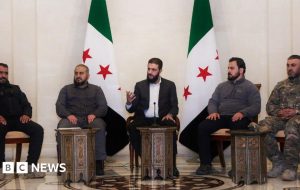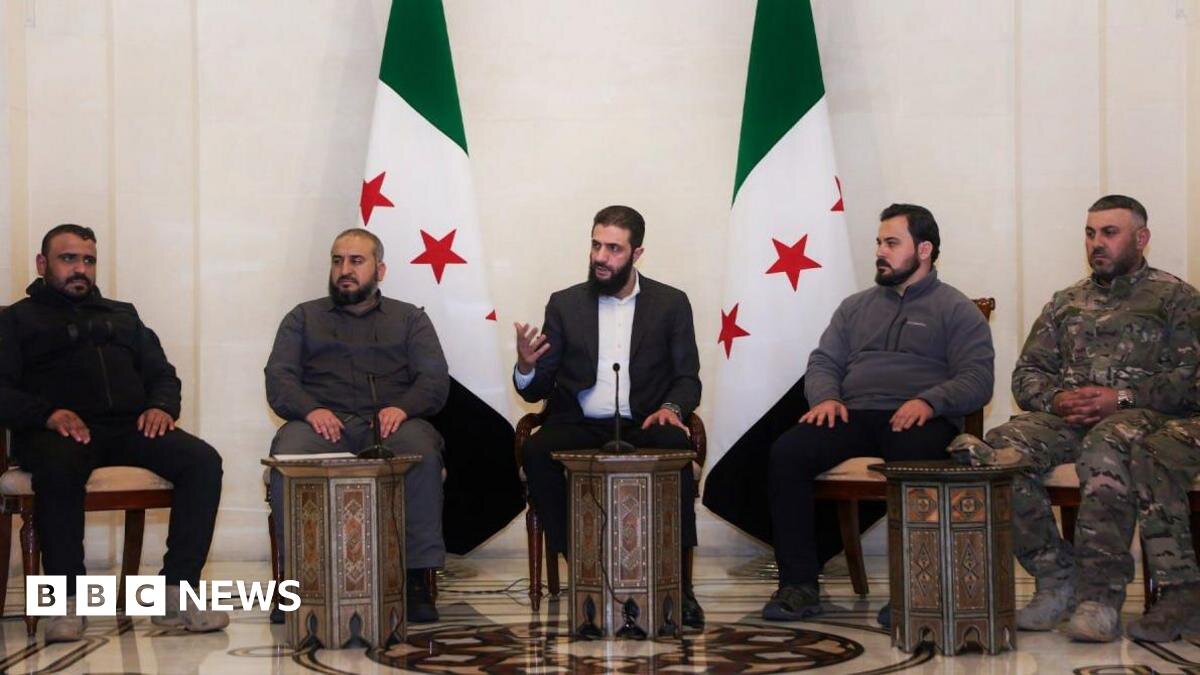Al-Jolani grants high ranks to non-Syrian mercenaries
BEIRUT – Days after reaching an agreement to dissolve the armed factions and merge them under the umbrella of Syria’s Ministry of Defense, the General Command has granted former fighters high ranks in the new army that is to be formed. , sparking widespread controversy in the Syrian streets. Hayat Tahrir al-Sham’s first-rank leaders have


BEIRUT – Days after reaching an agreement to dissolve the armed factions and merge them under the umbrella of Syria’s Ministry of Defense, the General Command has granted former fighters high ranks in the new army that is to be formed. , sparking widespread controversy in the Syrian streets.
Hayat Tahrir al-Sham’s first-rank leaders have been granted the ranks of “Brigadier General,” knowing that such a constitutional step requires the issuance of a presidential decree.
While the leaders of other factions were marginalized, especially those funded by Turkey, the rank of “Colonel” has been granted only to the leaders of the factions allied with Hayat Tahrir al-Sham (HTS).
Among these is the Turkistani Islamic Party’s Abu Muhammad al-Turkistani, a provocative step that will anger China. In his book The Call for Global Islamic Resistance, the famous jihadist theorist Abu Musab al-Suri reveals that the TIP was counting on the US support as part of a secret scheme, approved by Congress in 1995, to dismantle China by inflaming ethnic and religious conflicts.
It is worth noting that the interim government affiliated with the so-called “National Coalition for Syrian Revolutionary and Opposition Forces,” which manages the areas where the Turkish army is deployed in the north, has not yet contacted Mohamed al-Bashir’s government. It continues to manage its areas independently and recently issued a decision to promote police officers in the city of Azaz.
Meanwhile, the promotion decision has been issued by the General Command of the Syrian Army and Armed Forces, noting that it has been signed by “the General Command” without mentioning whether al-Sharaa is the commander-in-chief of the army.
Obviously, al-Sharaa, who has shown hesitation regarding drafting a new constitution, is moving quickly to restructure the security and military system, raising doubts about whether this is to impose the pillars of his authority before the elections, which al-Sharaa said “may not be held for four years.”
Al-Sharaa has previously stated that he would not assign people who he did not personally trust to manage the “first hundred days,” adding that the Syrian army would be demobilized and rely on HTS and new volunteers.
Al-Sharaa further pledged to dissolve all militias and that there would be no weapons except in the hands of the “Syrian state,” claiming that “Assad regime’s crimes have led to reliance on foreign fighters who deserve to be rewarded for supporting the Syrian people after they participated in the revolution and contributed to the overthrow of the regime,” hinting at his intention to naturalize them.
In an interview with Al Arabiya, Al Sharaa acknowledged that all the appointments were of the same color “not to exclude anyone, but rather a necessity of the stage that requires harmony between the pillars of power.”
Al-Sharaa was firm that “anyone connected to ISIS is an enemy” and that he would fight it everywhere in Syria. At the same time, he obliged the factions in southern Syria to hand over heavy weapons and warned them against approaching the capital. In parallel, he is negotiating with other factions, including defected officers (who at one point formed the Free Army).
Apparently, al-Sharaa seeks to consolidate his alliance with Turkey and Qatar and avoid Jordan and the UAE; however, he seems interested in cooperating with Saudi Arabia and Egypt. Despite his interest in good relations with the Europeans, he focuses on the relationship with Washington, to which he has repeatedly reiterated that they have a common enemy, “Iran and Hezbollah”.
In parallel, he supports settling the Kurdish crisis, contrary to the ambition of the Turks who insist on ending the military presence of the SDF forces. He stated that he does not have the ability or desire to engage in fighting the Kurds, but he does not mind Turkey doing the job alone, despite his belief that addressing this file requires an understanding with the US.
